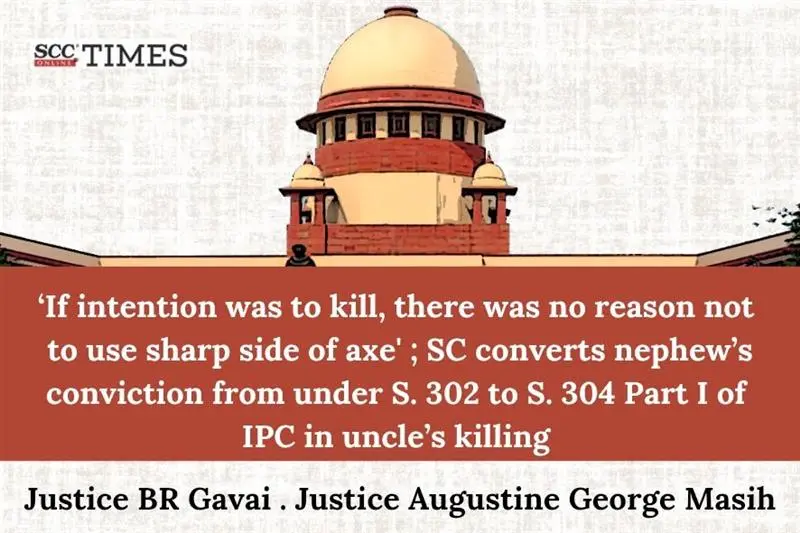Supreme Court: In a criminal appeal against the Bombay High Court’s decision, whereby the High Court dismissed the appeal filed by the present accused and affirmed the Trial Court’s decision convicting the accused for offence under Sections 302, 324 read with Section 34 of the Penal Code, 1860 (‘IPC’), the Division Bench of BR Gavai* and Augustine George Masih, JJ. partly allowed the appeal and converted the conviction under Section 302 of the IPC to Part I of Section 304 of the IPC, considering that there was no premeditation of killing the deceased.
Background
The deceased and the co-accused were brothers. Their agricultural fields were adjacent to each other, with a common boundary and a well. The complainant is the son of the deceased, and the present accused is the son of the co-accused.
When the complainant had gone to his field, the accused hurled abuses at the complainant regarding the use of the common boundary to operate the electric pump on the well. The complainant narrated the incident to his parents. Thereafter, the complainant and his parents went to the field and asked the accused for an explanation as to why he was obstructing the complainant. Upon such confrontation, the accused and the co-accused became aggressive and assaulted the deceased and the complainant. The people present in nearby fields (prosecution witnesses) separated them and took the complainant and the deceased to the Government Hospital.
The Trial Court convicted both the accused and the co-accused.
Analysis and Decision
On perusing the post-mortem report and evidence of the medical officer, the Court noted that the death of the deceased was homicidal. Hence, the Court upheld the finding of the Trial Court that the accused, along with the co-accused, caused injuries to the deceased, resulting in his death.
Regarding the question that whether the offence committed by the accused would come under the ambit of Section 302 of the IPC or can it be altered into a lesser offence, the Court perused the witnesses’ testimonies. The Court reiterated that merely because the witnesses are relatives of the deceased, and as such are interested witnesses, that alone cannot be a ground to discard their testimony. Perusing the evidence of the deceased’s nephew, the Court noted that the co-accused was assaulting the deceased with the blunt side of the axe, and the accused was armed with a stick and he assaulted the deceased with the said stick.
Noting that the place of the incident is near the house of the accused persons, the Court said that the possibility of a quarrel taking place on account of previous enmity between the accused and the deceased; and in a sudden fight in the heat of the moment, the possibility of the accused along with the co-accused assaulting the deceased could not be ruled out. Regarding the usage of a stick and the blunt side of the axe, the Court said that these tools are easily available in any agricultural field. Hence, any premeditation was ruled out.
If their intention was to kill the deceased, there was no reason why the co-accused would not have used the sharp side of the axe. The nature of injury and the evidence of the prosecution witnesses would also not show that the accused had taken undue advantage or acted in a cruel manner, the Court stated.
Therefore, the Court held that the present case did not fall under the ambit of Section 302 of the IPC and the accused was entitled to the benefit of Exception IV of Section 300 of the IPC. The Court noted that the accused had already undergone the sentence of 6 years and 10 months, hence, the Court sentenced the accused to the period already undergone, while converting his conviction under Section 302 of the IPC to Part I of Section 304 of the IPC.
CASE DETAILS
|
Citation: Appellants : Respondents : |
Advocates who appeared in this case For Petitioner(s): For Respondent(s): |
CORAM :









